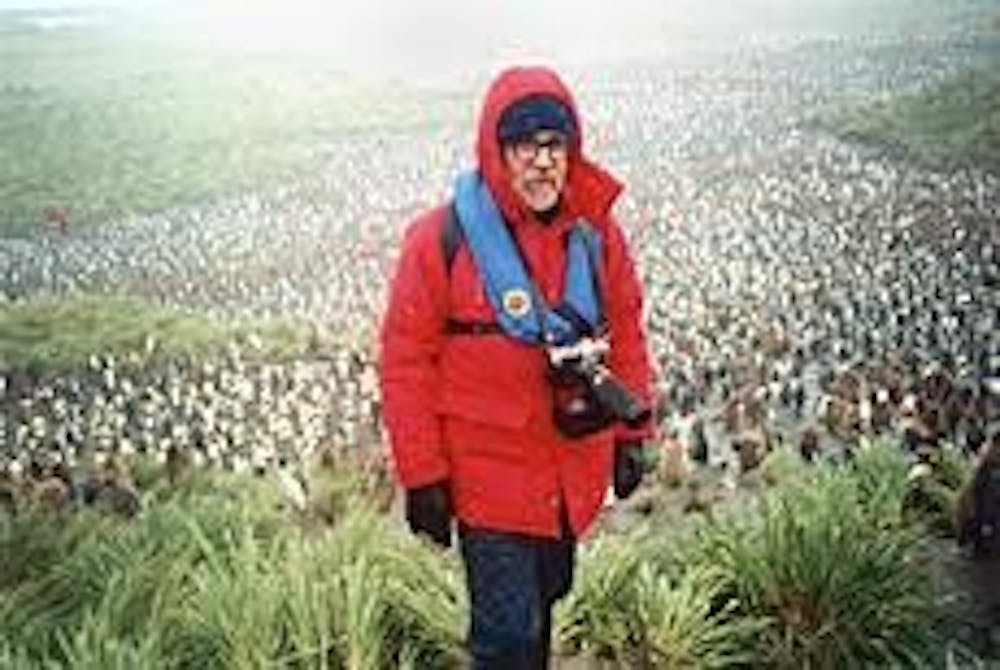In more than 40 years at AU, College of Arts and Sciences professor Dr. Jack Child has become known for many things, including loving penguins, impersonating Fidel Castro and teaching one of the most popular classes on campus.
"Having had two classes with Dr. Child in one semester, I realized how rare of a find he is," said Jason Eisen, a rising senior in the School of International Service. "Few professors care about their students the way in which he does, and not just in the classroom, either."
Child's unique background gives clues about his expertise and appeal to students. He was born in Buenos Aires, Argentina, to American parents, but came to the United States in 1955 to attend Yale University. After graduation, he joined the Army as a Latin American Specialist. Child first came to AU as a graduate student in 1965, while still on active duty.
In 1980, after 20 years of military service, Child became eligible for retirement. He had two options: continue on in the military or retire and find another way to spend his time.
Child, who had taught at West Point for three years, identified teaching as something that he was interested in, and returned to AU in 1980 as the Assistant Dean of the School of International Service. After two years, he became a professor of Spanish and Latin American Studies.
"I could portray this as something very selfless, helping a generation and all that stuff," Child says. "The bottom line is that it's something I enjoyed doing."
Over the course of his career, Child has taught various courses, ranging from graduate classes to requirements for the general education program. Last semester, Child even crossed over to the School of International Service, teaching a course entitled "Hemisphere Instruments." The class was made up of a mixed crowd, half regular AU students and half military officers from the Organization of American States.
"The military included a general from the Dominican Republic and a colonel from Venezuela," Child said. "They kind of added some spice to it."
Anyone who has taken a class with Child knows he loves penguins. In fact, he incorporates them into many of his courses. In his general education course "Latin America: History, Art and Literature," Child spends some time teaching his class about the animals, saying that he sometimes can use them as a "hook" to increase students' interest in the topic.
Child's love of penguins can be traced back to a pamphlet that he read which advertised an educational cruise to Antarctica. One of Child's specialties is the study of Latin American geopolitical thinking, including the question of the "ownership" of Antarctica.
"I looked at the pamphlet, and realized that most of the guest speakers were biologists," Child said. However, he felt it was important to mention the historical and political issues of the area. "I called them up and offered my services."
A few weeks before the cruise, one of the regular speakers cancelled and Child was offered the opportunity to act as a guide and lecturer. While on the trip, he saw penguins in their natural habitat for the first time. After the trip, Child regularly returned as a guest lecturer, yet another experience that Child draws upon to teach his students.
"Penguins are fascinating little animals, especially when you can watch them in person," Child said. "I'm not a biologist or a specialist, but I've been on 12 trips and have some knowledge to share."
This isn't the only educational journey Child has taken. He has been to nearly every country in Latin America. Last semester, he visited the Panama Canal region. He arranged to teach several of his courses online and used technology like Blackboard to run discussion groups and assign readings.
Another thing students will remember about Child is his hefty collection of cultural artifacts, brought back from his travels to help students better understand the things they learn. These artifacts fill his office and home and he said he hopes they help students develop a connection with the history of Latin America.
"[Dr. Child] is one of those professors that makes you very proud to be an AU student," Eisen said. "I know I get just a little jealous whenever I talk to a younger student who is about to begin a class with Dr. Child; they just don't know what a great experience they are in for."
While Child has years of experience and a wealth of knowledge to share with his students, he realizes that his courses are not for everyone.
"They shouldn't take my class if they don't have an interest in Latin America," said Child. "But you should have an interest in Latin America, because it is an important part of how we deal with the world. We tend to take it for granted and ... historically we've tended to ignore it, and I think it's important for any citizen of this country to have some kind of knowledge of what Latin America is about."
Staff Writer Marissa Newhall
contributed to this report.





